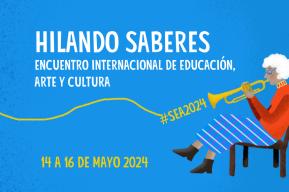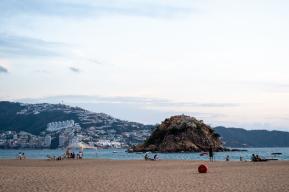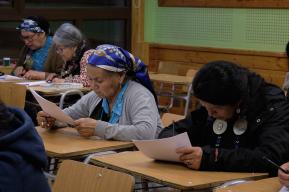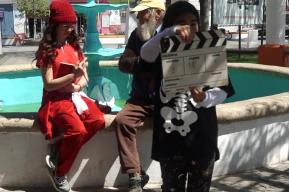Project
Emergency Heritage Fund (HEF) in Rapa Nui National Park (Chile)

This project is an initiative taking place in 2023, made possible through the financial support of the HEF Fund donors: the Qatar Fund for Development, the Government of Canada, the Kingdom of Norway, the French Republic, the Principality of Monaco, ANA Holdings INC., the Republic of Estonia, the Kingdom of the Netherlands, the Slovak Republic, the Grand Duchy of Luxembourg, the Principality of Andorra, and the Republic of Serbia.
Project context
The Culture Sector of the UNESCO Office in Santiago, through the Heritage Emergency Fund (HEF), is implementing the project "Assessment of Fire Damage in Rapa Nui National Park and Development of a Comprehensive Risk Management Plan for the World Heritage Site" in 2023.
The project was initiated because on October 4, 2022, the Rapa Nui National Park (Chile), recognized by UNESCO in 1995 as a World Heritage site, was affected by a fire that spread over more than 100 hectares. The main area affected was the crater of the Rano Raraku volcano, a place of special importance, as it is where the quarries for carving the moai are located, thus holding great spiritual and heritage significance for the inhabitants of the island and the world.
Response to the fires
In response to this emergency, the project "Assessment of Fire Damage in Rapa Nui National Park and Development of a Comprehensive Risk Management Plan for the World Heritage Site" was initiated, with funding of $97,000 from the UNESCO Heritage Emergency Fund. Its main goal is to strengthen local capacities to prevent, mitigate, and recover from the loss of cultural heritage as a result of natural disasters in Rapa Nui National Park.
The project is implemented under the supervision of the Culture team of the UNESCO Office in Santiago, and coordinated by a locally based and committed individual, in order to facilitate the delivery and cohesion of the various aspects of this project.
Work plan
The initiative has a one-year implementation period and considers three main components:
- A detailed assessment of the fire damage. This evaluation consisted of the development of a diagnostic and conservation proposal for the Rano Raraku site, carried out by an interdisciplinary team of professionals and local experts over a period of three months. This diagnosis, along with the environmental report, identified different symptoms and altering agents affecting the archaeological resources, even beyond the fire factor. Anthropogenic and geoclimatic agents were also detected.
- Development of a risk management plan for the "fire" factor directed at the World Heritage site. This plan was based on collaborative work with a team of local actors that make up the Rano Raraku Emergency Table, which emerged after the October 2022 fire. Among the participating actors are representatives from CONAF, the Municipality of Rapa Nui, the Provincial Delegation, the Technical Secretariat for Heritage of the National Service for Cultural Heritage of Chile, the Indigenous Community Mau Henua, the National Service for Disaster Prevention and Response (Senapred), Firefighters, and the Institute for Agricultural Development (INDAP).
- Training sessions on the development of a management plan for the World Heritage site. In November 2023, workshops were held led by Mexican archaeologist Nelly Robles, who led and managed the Monte Albán World Heritage site (Oaxaca, Mexico). These workshops were aimed at the Mau Henua indigenous community, CONAF, and the Technical Secretariat for Heritage.
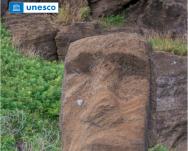
More Information on the Heritage Emergency Fund (HEF)
World Heritage sites are increasingly threatened due to natural causes and the evolution of social and economic life, putting at risk unique and irreplaceable assets for humanity. In response to this situation, UNESCO assumes its role in ensuring their conservation and protection, offering recommendations, hosting global conventions, and contributing to collective heritage protection systems.
The Heritage Emergency Fund (HEF) aims to strengthen the capacity of Member States in the prevention, mitigation, and recovery from the loss of heritage and cultural diversity in emergency situations, and to promote the integration of culture protection in humanitarian action, security strategies, and peacebuilding processes, including leveraging the potential of culture to strengthen resilience and aid recovery.
It finances preparedness and response activities in emergency situations within the scope of UNESCO's cultural conventions. This includes immovable natural and cultural heritage, movable cultural heritage, cultural repositories, underwater cultural heritage, intangible cultural heritage, and the diversity of cultural goods, services, and expressions.
Among the objectives of this fund is the strengthening of Member States' capacity to prevent, mitigate, and recover from the loss of heritage and cultural diversity as a result of conflicts and natural disasters, a situation that corresponds to the World Heritage site in Rapa Nui.
News
Events
Multimedia: Testimonies of people involved in this project





Coordination of this project at UNESCO Santiago:








